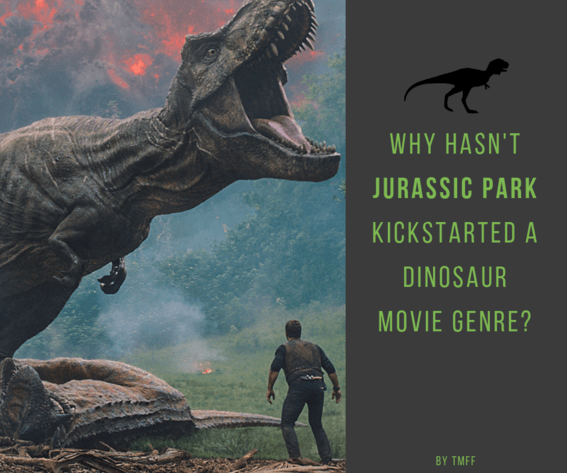Some of the biggest blockbusters have to do with our fear of the unknown – aliens, sea monsters, big natural disasters, and of course, our pre-historic predecessors that once roamed the earth before we arrived: dinosaurs. Yet even though we can easily mention a few big hits in other monster movie genres, the dinosaur franchise never seemed to take off, except for the iconic Jurassic Park movies and their recent reboots. Why have they failed to produce a so-called “Jurassic Park effect”, where audiences would see numerous other dinosaur-themed movies released after the original film’s success?
The Success of the Original Jurassic Park
The original Jurassic Park trilogy kickstarted when the first film was released in 1993, based on the Jurassic Park novel written by Michael Crichton in 1990 – who also penned several other popular sci-fi inspired books and films, including the original 1973 Westworld film upon which the HBO TV series is based. The original trilogy included The Lost World: Jurassic Park in 1995 and the unimaginatively named Jurassic Park III in 2001, with the first two films directed by the blockbuster mastermind Steven Spielberg himself – who was recently rumored to be revisiting his Indiana Jones franchise with the aim to bring us a 5th instalment by 2020. The plot revolves around the attempt to recreate dinosaurs by cloning their DNA from mosquitoes that were trapped in amber. The bioengineering enterprise in charge of the cloning is owned by a businessman who uses the cloned dinosaurs as live exhibits in the titular theme park – but when the security system of the park fails and dinosaurs escape, all hell breaks loose.
The impact on pop culture was tremendous: even people who have never actually seen the movies are familiar with the central premise and plot elements. The immense success of the first film spawned two further instalments that were not as well received and has also led to a reboot trilogy that started in 2015 with Jurassic World, continued in 2018 with Jurassic World: Fallen Kingdom and is set to end with a final instalment that will hit theatres in 2021. It also inspired an incredible array of merchandise, from tank tops sporting a sexy Jeff Goldblum on Hot Topic, to games like Betway’s Jurassic Park online slot game, the video game Jurassic World Evolution and a dedicated Jurassic Park version of Hasbro’s classic Monopoly board game. It also created a whole attraction at the Universal Studios Hollywood theme park, set to open its gates in 2019. Yet, even though the Jurassic Park logo can be found on almost any type of product, there is one media the films failed to inspire further: the film industry itself.
Why Has Jurassic Park’s Dinosaur Plot Failed to Inspire Other Filmmakers?
While movies like the 2004 remake of the 1978 film Dawn of the Dead managed to breathe new life into a whole genre, inspiring new films and TV series like The Walking Dead, there were next to no serious attempts to create more dinosaur movies. This is no coincidence, once you take the budget into account: the Jurassic Park franchise is renowned for its elaborate and well-thought-out special effects, that had a lot to do with how audiences received the first movies. Spielberg made sure that he put together a team of the best to work on bringing the extinct grand reptiles to life, combining hands-on animation with then cutting-edge technology, eventually adding CGI into their toolkit. This resulted in realistic scenes full of suspense, especially when the majestic T-Rex chases the protagonists around the park, keeping moviegoers at the edge of their seats. Although the films worked wonders in propelling CGI tech forward, it was very hard to replicate their special effects without ending up with a cheap copycat result.
Yet the prohibitive cost of special effects along with the expensive movie sets they required was not the only obstacle for aspiring filmmakers to overcome. They would also have to come up with a plot that would see dinosaurs realistically brought back to life without piggybacking on Crichton’s DNA cloning idea. Other options would include a “lost world” premise that was also already done in 1933’s King Kong – who lived in uncharted Skull Island along with dinosaurs that were saved from extinction – or time traveling, which is traditionally used in sci-fi in order to set the plot in futuristic dystopian societies or in eras where human civilization still shone. Instead, investing money in time-consuming special effects and tailored sets without having anything new to say about dinosaur revival was too much of a risk for Hollywood studios. Jurassic Park, on the other hand, managed to survive not only due to its brilliant central plot – originally also putting forward hard morality dilemmas with its cloning, theme park and fight for survival plot points – but also because it established a successful brand that later movies could still build on.
Jurassic Park remains as iconic today as it was 25 years ago when it was first released – and that success was perhaps never meant to be repeated.









Leave a reply